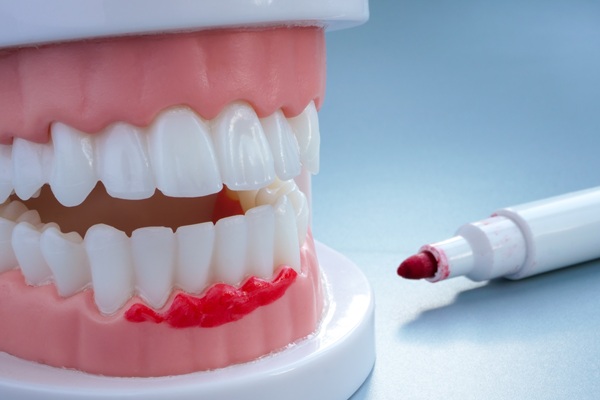Can You Reverse Gum Disease at Home?

If your dentist has diagnosed you with gum disease, you should start making improvements to your oral hygiene right away. The faster you catch this condition, the more likely you are to overcome it. People who ignore the disease can find themselves with various oral health issues, including tooth loss. Eventually, the condition can affect other parts and systems of the body. There are some basic things you can do alone to fight this disease.
Understanding gingivitis
Gum disease starts as a condition known as gingivitis. This common issue manifests itself when an individual has swollen, inflamed, and bleeding gums. The bleeding can occur during brushing or at other times. Gingivitis can be uncomfortable and painful. It develops when food is left in between teeth and at the gumline and turns into plaque. It will also leave behind bacteria, which can damage the teeth and gums.
Understanding periodontitis
People who immediately begin treating gingivitis can reverse the condition and once again have healthy gums. As it progresses, however, it can turn into full-fledged gum disease known as periodontitis. The gums will become red and will start to shrink, pulling away from the teeth. This will eventually lead to bone loss, causing the teeth to become loose and even fall out. Excessive bacteria can cause infections in the mouth, which can spread throughout the body. Periodontitis is linked to cardiovascular problems as well.
Quick intervention
The most effective approach to treating gum disease is to do so promptly. Some patients may recognize that they have the signs and symptoms of the conditions. Other people may not realize it until a dentist points it out. The faster the individual starts to address the disease, the less likely it will become periodontitis. While a person can reverse gingivitis, periodontitis is controllable but irreversible.
Home treatment methods
The first line of defense against mild or moderate gum disease is to adopt good oral hygiene. Most people with the disease do not brush or floss regularly or properly. Brushing twice a day with fluoride-based toothpaste and a soft-bristled brush will help prevent plaque buildup. Daily flossing will dislodge food particles and keep bacteria from forming in pockets on the gumline.
It can also help to rinse with a mouthwash. Individuals should make these activities regular habits. Doing so can make the gums healthy and well once more. If these habits begin early enough, it is possible to reverse the effects of gingivitis without treatment at the dentist’s office.
For more serious cases of gum disease
For people with periodontitis, the dentist will have to intervene to prevent tooth loss and the spread of infections. The dentist may do root scaling or planning procedures. Gum contouring may also be necessary. The dentist can also prescribe oral or topical antibiotics.
Give your oral health the attention it deserves
You should never dismiss the seriousness of gum disease. You can stop it and regain your oral health when you treat it right away. Follow these at-home tips to help prevent future oral health issues. If you have questions, call our Turlock office.
Request an appointment here: https://turlockdentistry.com or call Turlock Dentistry And Implants at (209) 667-5405 for an appointment in our Turlock office.
Check out what others are saying about our dental services on Yelp: Gum Disease in Turlock, CA.
Related Posts
If your dentist has diagnosed you with gum disease, you should seek treatment right away. If you do not address this problem quickly, it can become increasingly more serious. The faster you identify this condition, the more likely you are to treat it effectively. With the right intervention at the right time, you can reverse…
Flossing is an important component of preventive dentistry. Flossing must always accompany daily brushing. This may seem insignificant. After all, it involves running a line of floss through the thin gaps of your teeth. Even so, flossing benefits your teeth. If you want to know how valuable flossing is for preventive dentistry, here are the…
The role of preventative dentistry is to minimize the risk of future dental issues in patients. Read on to learn some tips that encourage the prevention of oral issues. If you have experienced and treated dental issues in the past, you will attest that it is better to prevent them from happening in the first…
All-on-4 implant treatment has become a transformative option for individuals seeking full-arch restoration, and understanding several important factors before choosing all-on-4 is essential.Before patients undergo all-on-implant placement, their dental provider will need to determine if they are ideal candidates. Factors that contribute to this include: Sufficient bone density Good overall oral health Healthy gum tissue…
